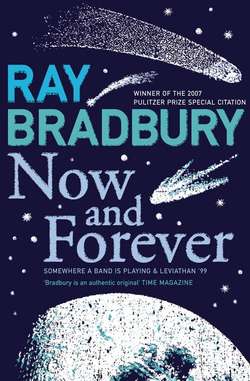Читать книгу Now and Forever - Рэй Брэдбери, Ray Bradbury Philip K. Dick Isaac Asimov - Страница 18
TWELVE
Оглавление‘I …,’ said Cardiff.
‘Enough,’ Culpepper interrupted. ‘For tonight.’
He held out another glass of bright amber wine. Cardiff drank. When he looked up, the front screen door of the Egyptian View Arms tapped shut. Someone went upstairs. His ambiance stayed.
Cardiff refilled his glass.
‘Never coming home. Never ever,’ he whispered.
And went up to bed.
Sleep well, someone said somewhere in the house. But he could not sleep. He lay, fully dressed, doing philosophical sums on the ceiling, erasing, adding, erasing again until he sat up abruptly and looked out across the meadow town of thousands of flowers in the midst of which houses rose and sank only to rise again, ships on a summer sea.
I will arise and go now, thought Cardiff, but not to a bee-loud glade. Rather, to a place of earthen silence and the sounds of death’s-head moths on powdery wings.
He slipped down the front hall stairs barefoot and once outside, let the screen door tap shut silently and, sitting on the lawn, put on his shoes as the moon rose.
Good, he thought, I won’t need a flashlight.
In the middle of the street he looked back. Was there someone at the screen door, a shadow, watching? He walked and then began to jog.
Imagine that you are Claude, he thought, his breath coming in quick pants. Turn here, now there, now another right and—
The graveyard.
All that cold marble crushed his heart and stopped his breathing. There was no iron fence around the burial park.
He entered silently and bent to touch the first gravestone. His fingers brushed the name: BIANCA SHERMAN BATES
And the date: BORN, JULY 3, 1882
And below that: R.I.P.
But no date of death.
The clouds covered the moon. He moved on to the next stone.
WILLIAM HENRY CLAY
1885—
R.I.P.
And again, no mortal date.
He brushed a third gravestone and found:
HENRIETTA PARKS
August 13, 1881
Gone to God
But, Cardiff knew, she had not as yet gone to God.
The moon darkened and then took strength from itself. It shone upon a small Grecian tomb not fifty feet away, a lodge of exquisite architecture, a miniature Acropolis upheld by four vestal virgins, or goddesses, beautiful maidens, wondrous women. His heart pulsed. All four marble women seemed suddenly alive, as if the pale light had awakened them, and they might step forth, unclad, into the tableau of named and dateless stones.
He sucked in his breath. His heart pulsed again.
For as he watched, one of the goddesses, one of the forever-beautiful maidens, trembled with the night chill and shifted out into the moonlight.
He could not tell if he was terrified or delighted. After all, it was late at night in this yard of the dead. But she? She was naked to the weather, or almost; a mist of silk covered her breasts and plumed around her waist as she drifted away from the other pale statues.
She moved among the stones, silent as the marble she had been but now was not, until she stood before him with her dark hair tousled about her small ears and her great eyes the color of lilacs. She raised her hand tenderly and smiled.
‘You,’ he whispered. ‘What are you doing here?’
She replied quietly, ‘Where else should I be?’
She held out her hand and led him in silence out of the graveyard.
Looking back he saw the abandoned puzzle of names and enigma of dates.
Everyone born, he thought, but none has died. The stones are blank, waiting for someone to date their ghosts bound for Eternity.
‘Yes?’ someone said. But her lips had not moved.
And you followed me, he thought, to stop me from reading the gravestones and asking questions. And what about the absent children, never coming home?
And as if they glided on ice, on a vast sea of moonlight, they arrived where a crowd of sunflowers hardly stirred as they passed and their feet were soundless, moving up the path to the porch and across the porch, and up the stairs, one, two, three floors until they reached a tower room where the door stood wide to reveal a bed as bright as a glacier, its covers thrown back, all snow on a hot summer night.
Yes, she said.
He sleepwalked the rest of the way. Behind him, he saw his clothes, like the discards of a careless child, strewn on the parquetry. He stood by the snowbank bed and thought, One last question. The graveyard. Are there bodies beneath the stones? Is anyone there?
But it was too late. Even as he opened his mouth to question, he tumbled into the snow.
And he was drowning in whiteness, crying out as he inhaled the light and then out of the rushing storm, a warmness came; he was touched and held, but could not see what or who held him, and he relaxed, drowned.
When next he woke, he was not swimming but floating. Somehow he had leaped from a cliff, and someone with him, unseen, as he soared up until lightning struck, tore at him in half terror, half joy, to fall and strike the bed with his entire body and his soul.
When he awoke again, the storm over, and the flying gone, he found a small hand in his, and without opening his eyes he knew that she lay beside him, her breath keeping time with his. It was not yet dawn.
She spoke.
‘Was there something you wanted to ask?’
‘Tomorrow,’ he whispered. ‘I’ll ask you then.’
‘Yes,’ she said quietly. ‘Then.’
Then, for the first time, it seemed, her mouth touched his.
